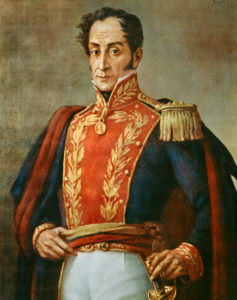Do you want to know facts about Simon Bolivar? This figure was influential in the history of South America and was one of the most important figures in its history. So, before telling you some interesting facts, let’s start with his background.

Who is Simón Bolívar?
Born in Caracas, Venezuela, Simón Bolívar is famous for founding the Republic of Bolivia and the Gran Colombia. He played an influential role in South American freedom movement against the Spanish Empire. Born in a wealthy Criollo family, he was able to study in Spain and France when he was a teenager. In 1808, he started his campaign for independence, and Venezuela, his home country, became an independent country in 1811. However, there continued to be a civil war. Ten years later, Bolívar won the Battle of Carabobo, which was one of the most important events in the independence process of Venezuela. Because of the victory in Battle of Carabobo, Venezuela full became independent from Spanish rule. This was the start of a long list of independent movements that were led by him.
Interesting Facts about Simón Bolívar
1. His name is really long.
Have you ever complained about the length of your name? Well, Bolívar’s full name was Simón José Antonio de la Santísima Trinidad Bolívar Palacios Ponte y Blanco. This is because the way names were chosen was not regulated until the 19th century. On top of that, people believed that the more names they had, the more they will be protected from evil.
2. His parents died when he was a child.
Bolívar’s father died from tuberculosis when he was two, and her mother died from the same illness when he was nine. He was placed into the custody of one of his uncles, but they didn’t get along well.
When he was an infant, the family’s slave called Hipólita took care of him and practically raised him. This is why he refers to her as “the only mother I have known.”
3. He was married for less than a year.
When he was in Spain, he fell in love with María Teresa Rodríguez del Toro y Alaiza and married her. Then, they returned to Venezuela and after only 8 months, she died from yellow fever. Bolívar was so devastated that he swore he would never marry again, and despite the numerous lovers he had during his lifetime, he kept his promise.
4. He liberated 6 countries.
After liberating Venezuela, Bolívar led other independence movements across Latin America. This resulted in the independence of the Spanish territories of Peru, Ecuador, Colombia, Bolivia, and Panama.
5. Bolívar betrayed Francisco de Miranda, a very important Venezuelan revolutionary.
Francisco de Miranda was a Venezuelan revolutionary who participated in the French Revolution and tried to liberate Venezuela before Bolívar. However, his attempts at liberating failed. In 1810, when the War of Independence started, Bolívar convinced Miranda to return to Venezuela and participate in the revolution. However, once in Venezuela, Miranda thought the revolution was lost when Spanish Captain quickly advanced into the territory of the revolutionaries. Because of this, Miranda signed an agreement with the Spanish Captain.
Bolívar thought that was treachery, so he arrested him and turned him over the Spanish, who imprisoned him. In the end, Miranda died in a Spanish prison four years after Bolívar’s betrayal.
6. Bolívar was part of the foundation of the first union of independent nations in Latin America.
Bolívar thought that joining different countries together meant that Latin America could successfully confront the European authorities and the United States. So, in 1819, Gran Colombia was founded, and it included the territories of Venezuela, Ecuador, Colombia, Panama, and part of Guyana, Peru, and Brazil.
However, Gran Colombia failed and was dissolved in 1831. It wasn’t successful because Bolívar was accused of wanting to establish a permanent dictatorship. The model of government was centralist, and he was the only president between 1819 and 1830.
7. He used his fortune to finance the independence movement.
Bolívar’s family was aristocratic and wealthy. Their fortune came from mine of copper, gold, and silver. He got help from other countries, like Haiti, which gave Venezuela material support and soldiers during some of the battles. But, Bolívar used all his fortune to finance the independence movement. That’s why he was poor when he died from tuberculosis in 1830. This might seem like a shocking Simon Bolivar fact
8. He ordered his general to destroy the archive of his letters, writings, and speeches, but he disobeyed.
Before dying, Bolívar ordered General Daniel F. O’Leary to burn what was left of the archive of his letters, writings, and speeches. Since O’Leary disobeyed, we have such an extensive knowledge of his thought and philosophy today. This archive also included the letters that he shared with his most known lover, Manuelita Saénz, which were compiled and published in 2007.
I hope that you enjoyed reading the facts about Simon Bolivar. If you want to read more, visit historical figures page.
